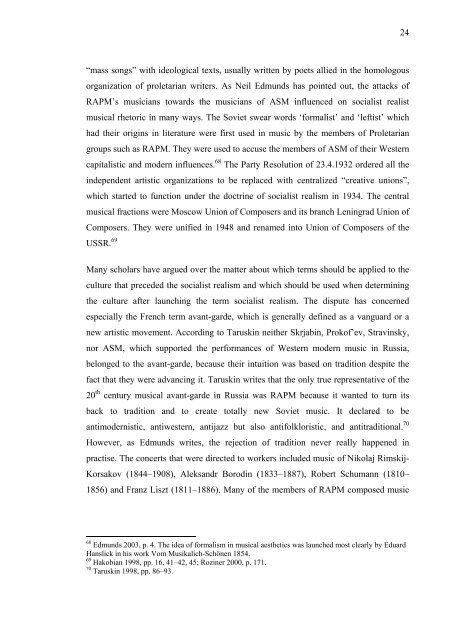Boris Asaf'ev and the Soviet Musicology - E-thesis
Boris Asaf'ev and the Soviet Musicology - E-thesis
Boris Asaf'ev and the Soviet Musicology - E-thesis
You also want an ePaper? Increase the reach of your titles
YUMPU automatically turns print PDFs into web optimized ePapers that Google loves.
“mass songs” with ideological texts, usually written by poets allied in <strong>the</strong> homologous<br />
organization of proletarian writers. As Neil Edmunds has pointed out, <strong>the</strong> attacks of<br />
RAPM’s musicians towards <strong>the</strong> musicians of ASM influenced on socialist realist<br />
musical rhetoric in many ways. The <strong>Soviet</strong> swear words ‘formalist’ <strong>and</strong> ‘leftist’ which<br />
had <strong>the</strong>ir origins in literature were first used in music by <strong>the</strong> members of Proletarian<br />
groups such as RAPM. They were used to accuse <strong>the</strong> members of ASM of <strong>the</strong>ir Western<br />
capitalistic <strong>and</strong> modern influences. 68 The Party Resolution of 23.4.1932 ordered all <strong>the</strong><br />
independent artistic organizations to be replaced with centralized “creative unions”,<br />
which started to function under <strong>the</strong> doctrine of socialist realism in 1934. The central<br />
musical fractions were Moscow Union of Composers <strong>and</strong> its branch Leningrad Union of<br />
Composers. They were unified in 1948 <strong>and</strong> renamed into Union of Composers of <strong>the</strong><br />
USSR. 69<br />
Many scholars have argued over <strong>the</strong> matter about which terms should be applied to <strong>the</strong><br />
culture that preceded <strong>the</strong> socialist realism <strong>and</strong> which should be used when determining<br />
<strong>the</strong> culture after launching <strong>the</strong> term socialist realism. The dispute has concerned<br />
especially <strong>the</strong> French term avant-garde, which is generally defined as a vanguard or a<br />
new artistic movement. According to Taruskin nei<strong>the</strong>r Skrjabin, Prokof’ev, Stravinsky,<br />
nor ASM, which supported <strong>the</strong> performances of Western modern music in Russia,<br />
belonged to <strong>the</strong> avant-garde, because <strong>the</strong>ir intuition was based on tradition despite <strong>the</strong><br />
fact that <strong>the</strong>y were advancing it. Taruskin writes that <strong>the</strong> only true representative of <strong>the</strong><br />
20 th century musical avant-garde in Russia was RAPM because it wanted to turn its<br />
back to tradition <strong>and</strong> to create totally new <strong>Soviet</strong> music. It declared to be<br />
antimodernistic, antiwestern, antijazz but also antifolkloristic, <strong>and</strong> antitraditional. 70<br />
However, as Edmunds writes, <strong>the</strong> rejection of tradition never really happened in<br />
practise. The concerts that were directed to workers included music of Nikolaj Rimskij-<br />
Korsakov (1844–1908), Aleks<strong>and</strong>r Borodin (1833–1887), Robert Schumann (1810–<br />
1856) <strong>and</strong> Franz Liszt (1811–1886). Many of <strong>the</strong> members of RAPM composed music<br />
68 Edmunds 2003, p. 4. The idea of formalism in musical aes<strong>the</strong>tics was launched most clearly by Eduard<br />
Hanslick in his work Vom Musikalich-Schönen 1854.<br />
69 Hakobian 1998, pp. 16, 41–42, 45; Roziner 2000, p. 171.<br />
70 Taruskin 1998, pp. 86–93.<br />
24

















